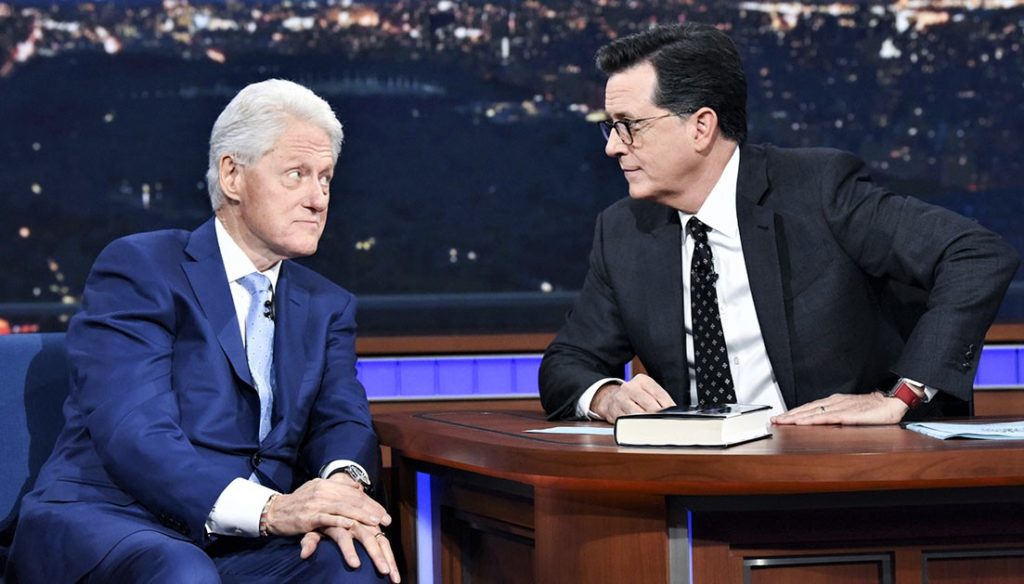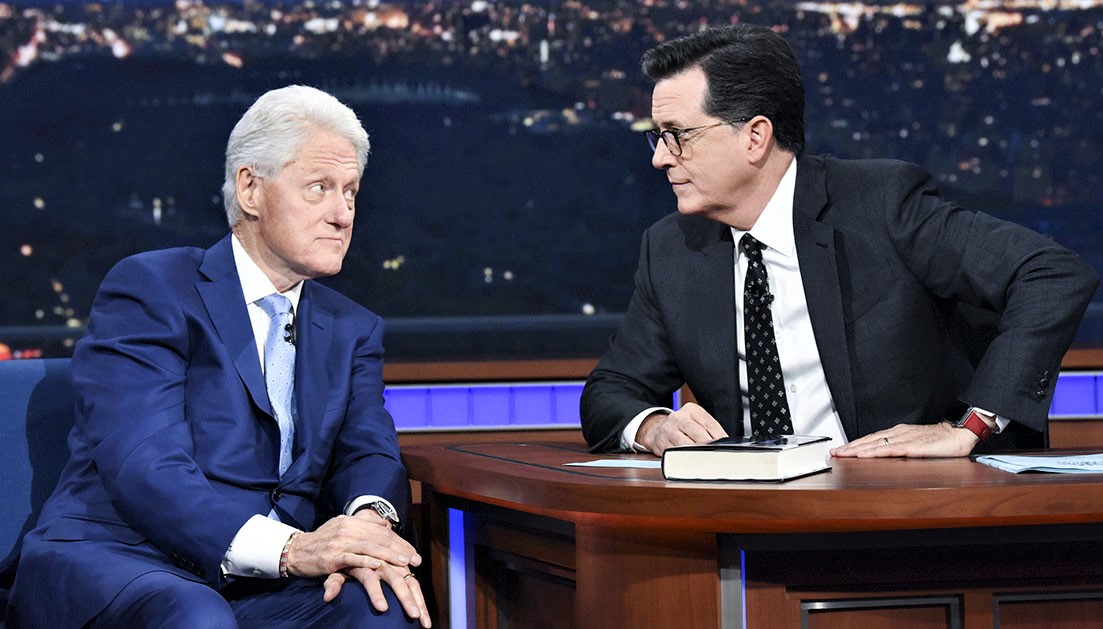On Tuesday’s Late Show with Stephen Colbert, Bill Clinton tried to explain his fumbled apology to Monica Lewinsky in response to a question by an NBC reporter the previous day.
Colbert offers Clinton a “do-over.”

“Here’s what I want to say: It wasn’t my finest hour, but the important thing is, that was a very painful thing, 20 years ago, I apologized to my family, to Monica Lewinsky and her family, to the American people. I meant it then and I meant it now, and I’ve had to live with the consequences ever since,” Clinton said.
Colbert was respectful but wasn’t quite buying it.
“It seems like the spirit of the #MeToo movement is that it doesn’t matter how long ago it happened, examples of men who were not held accountable for their behavior — especially men in power with younger women or people who worked for them — is worthy of being re-adjudicated,” Colbert said. “It seemed tone-deaf to me, because you seemed offended to be asked about this thing, when — in all due respect, sir — your behavior was the most famous example of a powerful man sexually misbehaving in the workplace of my lifetime.”
Clinton’s initial response to NBC’s Craig Melvin reminded me of statements from Charlie Rose, Matt Lauer and, most recently, Roseanne Barr who, after her racist tweet about former Obama senior advisor Valerie Jarrett, rationalized her actions by blaming a sleep aid. “It was 2 in the morning and I was Ambien tweeting.”
After former NBC Today Show host Matt Lauer was outed by several women for sexual harassment, he responded: “Some of what is being said about me is untrue or mischaracterized, but there is enough truth in these stories to make me feel embarrassed and ashamed.”
When Food Network chef Paula Deen was fired for using a racist epithet, Deen dug herself in deeper when she said she was sorry but was not herself a racist. “Would I have fired me? Knowing me? No.”
Others have put forth similar disingenuous apologies.
So, when is an apology an apology?
Contributing writer Margaret Renkl wrote a great piece in The New York Times recently (June 4).
“One of the most useful things Catholic school taught me,” she writes, “is the fundamental structure of apology. …it’s impossible not to notice that we’re all born with a powerful inclination for fault and failure. We lie. We treat others unkindly. We nurture wrongheaded notions because they make us feel a little bit better about our imperfect selves. Roman Catholic catechism calls this tendency ‘the sinful condition,’ but here in the 21st century, it’s more usefully known as being born a human being.”
Renkl talks about “The moral imperative of the Act of Contrition.”
Having been raised Roman Catholic myself, (although, I have not been practicing for some time), I consulted my Baltimore Catechism, the kids’ Bible as it were, on the essence of church doctrine in easy-to-understand refrains and drawings.
Lesson 31 describes confession as “…the telling of our sins to an authorized priest for the purpose of obtaining forgiveness.
“The chief qualities of a good confession are three: it must be humble, sincere and entire…. No Excuses, No Falsehoods, No Omissions.”
Note the clear first-person descriptors: “It was my fault; I am telling the truth; I am leaving nothing out.”
After confessing our sins to a priest and receiving penance (“the prayers or good works assigned by the priest after one has confessed his sins”), we complete the process when the priest says, “Now, say a good act of contrition” (“sorrow for sin with the intention of not committing the sin again”).
“O my God, I am heartily sorry for having offended Thee, and I detest all my sins, because of Thy punishments, but most of all because they offend Thee, my God, who art all-good and deserving of all my love. I firmly resolve, with the help of Thy grace, to sin no more and to avoid the near occasions of sin.”
Renkl breaks-down the act into four unambiguous steps that anyone can apply:
1) “Genuine remorse (not ‘I don’t remember it that way’ but ‘I am truly, wholeheartedly sorry.’)
2) “The expectation of unpleasant but entirely deserved consequences (not ‘I wouldn’t have fired me’ but ‘I’m seeking help to confront my racism.’)
3) “A resolution not to commit the same error again (not ‘I’m not as bad as some of these stories suggest’ but ‘I’m much worse than I ever imagined, and I plan to devote the rest of my life to making amends.’)
4) “A sincere effort to avoid the circumstances that led to the error in the first place (not ‘I won’t take Ambien any more’ but ‘I will no longer hang out online with racists.’)
Attending a performance of Late Nite Catechism, a dead-on parody of the real catechism classes I attended, I approached the nun at the end of “class” and apologized for a little funny but disrespectful indiscretion of my own.
“Sister,” I said, “I am heartily sorry for being disrespectful during class. For penance, I will say three “Our Fathers” and four “Hail Marys.” Would you be willing to sign my catechism?” I asked.
“Of course,” she said. She took a pen clipped to her habit and wrote the following on the front page of my book:
“To James: Behave Yourself!! Sister.”
You can learn a lot from a Catholic catechism.
Comments










